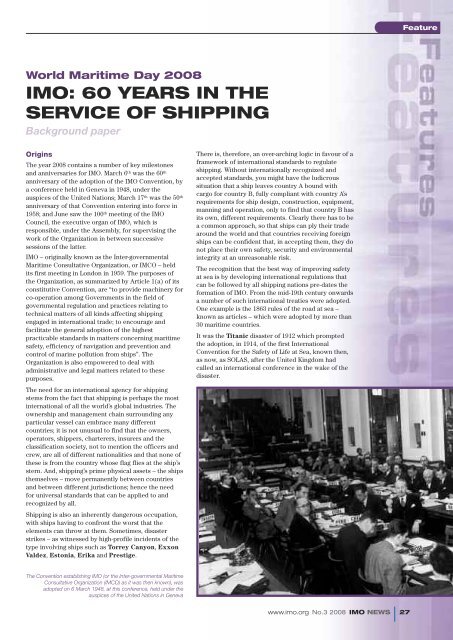IMO News
IMO News
IMO News
You also want an ePaper? Increase the reach of your titles
YUMPU automatically turns print PDFs into web optimized ePapers that Google loves.
Feature<br />
World Maritime Day 2008<br />
<strong>IMO</strong>: 60 YEARS IN THE<br />
SERVICE OF SHIPPING<br />
Background paper<br />
Origins<br />
The year 2008 contains a number of key milestones<br />
and anniversaries for <strong>IMO</strong>. March 6 th was the 60 th<br />
anniversary of the adoption of the <strong>IMO</strong> Convention, by<br />
a conference held in Geneva in 1948, under the<br />
auspices of the United Nations; March 17 th was the 50 th<br />
anniversary of that Convention entering into force in<br />
1958; and June saw the 100 th meeting of the <strong>IMO</strong><br />
Council, the executive organ of <strong>IMO</strong>, which is<br />
responsible, under the Assembly, for supervising the<br />
work of the Organization in between successive<br />
sessions of the latter.<br />
<strong>IMO</strong> – originally known as the Inter-governmental<br />
Maritime Consultative Organization, or IMCO – held<br />
its first meeting in London in 1959. The purposes of<br />
the Organization, as summarized by Article 1(a) of its<br />
constitutive Convention, are “to provide machinery for<br />
co-operation among Governments in the field of<br />
governmental regulation and practices relating to<br />
technical matters of all kinds affecting shipping<br />
engaged in international trade; to encourage and<br />
facilitate the general adoption of the highest<br />
practicable standards in matters concerning maritime<br />
safety, efficiency of navigation and prevention and<br />
control of marine pollution from ships”. The<br />
Organization is also empowered to deal with<br />
administrative and legal matters related to these<br />
purposes.<br />
The need for an international agency for shipping<br />
stems from the fact that shipping is perhaps the most<br />
international of all the world’s global industries. The<br />
ownership and management chain surrounding any<br />
particular vessel can embrace many different<br />
countries; it is not unusual to find that the owners,<br />
operators, shippers, charterers, insurers and the<br />
classification society, not to mention the officers and<br />
crew, are all of different nationalities and that none of<br />
these is from the country whose flag flies at the ship’s<br />
stern. And, shipping’s prime physical assets – the ships<br />
themselves – move permanently between countries<br />
and between different jurisdictions; hence the need<br />
for universal standards that can be applied to and<br />
recognized by all.<br />
Shipping is also an inherently dangerous occupation,<br />
with ships having to confront the worst that the<br />
elements can throw at them. Sometimes, disaster<br />
strikes – as witnessed by high-profile incidents of the<br />
type involving ships such as Torrey Canyon, Exxon<br />
Valdez, Estonia, Erika and Prestige.<br />
There is, therefore, an over-arching logic in favour of a<br />
framework of international standards to regulate<br />
shipping. Without internationally recognized and<br />
accepted standards, you might have the ludicrous<br />
situation that a ship leaves country A bound with<br />
cargo for country B, fully compliant with country A’s<br />
requirements for ship design, construction, equipment,<br />
manning and operation, only to find that country B has<br />
its own, different requirements. Clearly there has to be<br />
a common approach, so that ships can ply their trade<br />
around the world and that countries receiving foreign<br />
ships can be confident that, in accepting them, they do<br />
not place their own safety, security and environmental<br />
integrity at an unreasonable risk.<br />
The recognition that the best way of improving safety<br />
at sea is by developing international regulations that<br />
can be followed by all shipping nations pre-dates the<br />
formation of <strong>IMO</strong>. From the mid-19th century onwards<br />
a number of such international treaties were adopted.<br />
One example is the 1863 rules of the road at sea –<br />
known as articles – which were adopted by more than<br />
30 maritime countries.<br />
It was the Titanic disaster of 1912 which prompted<br />
the adoption, in 1914, of the first International<br />
Convention for the Safety of Life at Sea, known then,<br />
as now, as SOLAS, after the United Kingdom had<br />
called an international conference in the wake of the<br />
disaster.<br />
The Convention establishing <strong>IMO</strong> (or the Inter-governmental Maritime<br />
Consultative Organization (IMCO) as it was then known), was<br />
adopted on 6 March 1948, at this conference, held under the<br />
auspices of the United Nations in Geneva<br />
www.imo.org No.3 2008 <strong>IMO</strong> NEWS 27
















